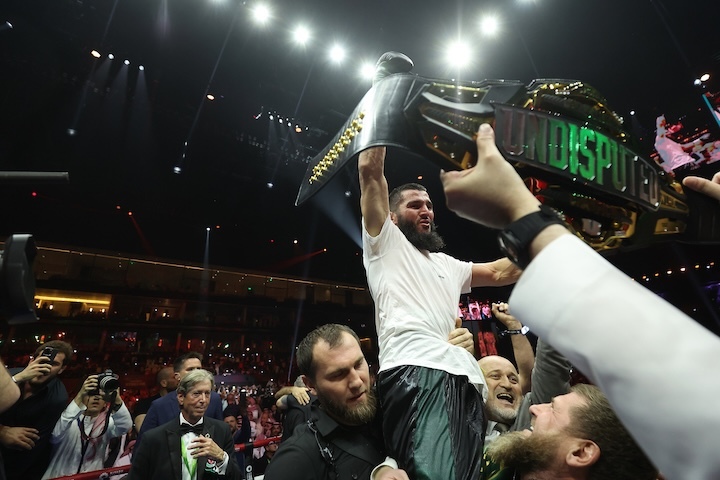IBF Keeps Playing Games, This Time With Beterbiev

By Eddie Sanchez
In the latest development threatening the work done to crown an undisputed champion, unbeaten, four-belt light heavyweight champion Artur Beterbiev has been informed that he must face an obscure opponent or risk losing his International Boxing Federation (IBF) title.
Less than 100 hours after his thrilling majority decision win over the previously undefeated WBA champion and fellow Russian Dmitry Bivol, Beterbiev (21-0, 20 KOs) learned that he is now required to fight little-known German contender Michael Eifert (13-1, 5 KOs).
The obvious question, posed by a representative from Beterbiev’s promoter, Top Rank, is: “Who is Michael Eifert?”
Despite calls for an immediate rematch from Bivol and other potential high-profile opponents like undefeated contenders David Benavidez, David Morrell Jr., and WBO’s top-ranked Anthony Yarde, Eifert, 26, has found himself at the top of the IBF rankings. This followed his unanimous decision victory over an aging Jean Pascal in March 2023 and a second-round TKO against lesser-known Carlos Eduardo Jimenez (13-6, 12 KOs) in August.
Beterbiev, 39, has numerous exciting possibilities ahead: a rematch with Bivol, a fight against the Benavidez-Morrell winner in early 2025, or even a potential blockbuster showdown with undisputed super middleweight champion Saul “Canelo” Alvarez.
Top Rank Chairman Bob Arum expressed his interest in negotiating a future bout with Alvarez. He mentioned a planned dinner meeting in December with Alvarez’s trainer-manager, Eddy Reynoso, during Oscar Valdez’s WBO junior lightweight title fight in Phoenix.
“We have a great relationship with Eddy and Canelo,” Arum told BoxingScene. “I’d love to sit down and discuss it over a meal.”
At the same time, Benavidez (29-0, 24 KOs), the WBC interim light heavyweight champion, stands as the mandatory challenger in that organization for Beterbiev.
However, the IBF insists Eifert is first in line for a mandatory defense, which again places the organization in a position to derail another undisputed champion, similar to earlier controversies. Earlier this year, the IBF ruled that Daniel Dubois had the right to replace undefeated heavyweight champion Oleksandr Usyk just days after Usyk’s thrilling win over Tyson Fury. The organization also stripped Alvarez of his title for not facing mandatory challenger William Scull, who went on to win the vacant title but remains relatively unknown.
“These organizations are really damaging the sport by not allowing champions to stay undisputed. It’s disappointing,” said Arum. “The IBF, especially, seems to get ahead of itself.”
Arum suggested that the various governing bodies should collaborate to decide future opponents after a fighter becomes undisputed. “After becoming undisputed, a champion should have the freedom to fight whomever they want,” he added.
Top Rank President Todd DuBoef pointed out the challenges of keeping titles unified. He noted that while Top Rank has successfully guided fighters like Terence Crawford, Josh Taylor, Devin Haney, and Tyson Fury to undisputed status, their reigns have been short-lived due to mandatory obligations.
“You hear ‘unify, unify, unify,’ and then ‘mandatory, mandatory, mandatory.’ It’s nearly impossible to hold onto all the belts,” DuBoef said. “It becomes an incredibly tough position to maintain.”
DuBoef emphasized that Beterbiev should be allowed time to enjoy his latest victory before making any decisions. While Eifert would likely be an easy opponent, DuBoef acknowledged that Beterbiev might prefer to pursue bigger fights and would likely have to relinquish the IBF title if he chooses that route.
“We can only present the opportunities in front of him,” DuBoef said. “It’s fantastic to be undisputed, but extremely difficult. Once you win, you often have to give up the titles.”
DuBoef compared the situation to global soccer, where top athletes compete in different leagues, but the World Cup only takes place once every four years. He suggested boxing could take a similar approach, where achieving an undisputed champion in each division every few years might be the best outcome.
The IBF’s strict enforcement of its mandatory fights is often attributed to past scandals, including one involving former president Robert Lee and Arum. The IBF’s adherence to its rules is seen as a way to avoid potential litigation, but critics argue the organization’s ratings system is outdated and easily manipulated.
Arum made a compelling argument: while mandatory rules may apply to non-unified champions, they should be relaxed for undisputed champions who have already proven themselves as the best in their division.
“The WBO, WBC, and even the WBA have all been reasonable on this matter,” Arum said. “Artur shouldn’t be wasting time with this German fighter he’d knock out in two rounds. There are much bigger fights out there, and he’ll fight anyone.”